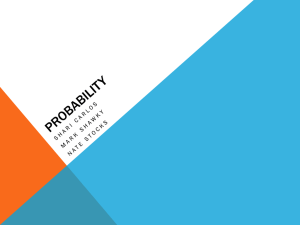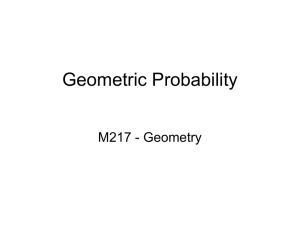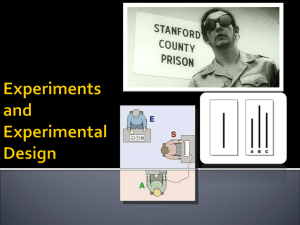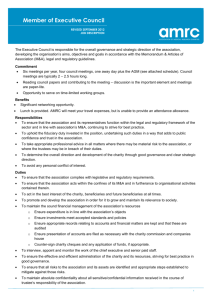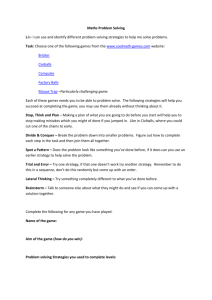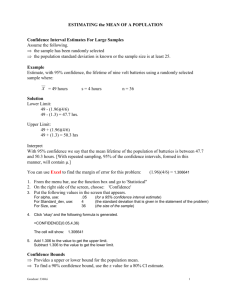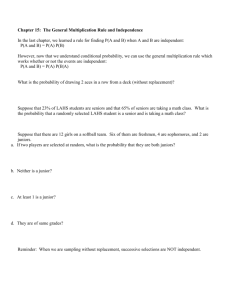Probability rules worksheet 2 with answers (1)
advertisement
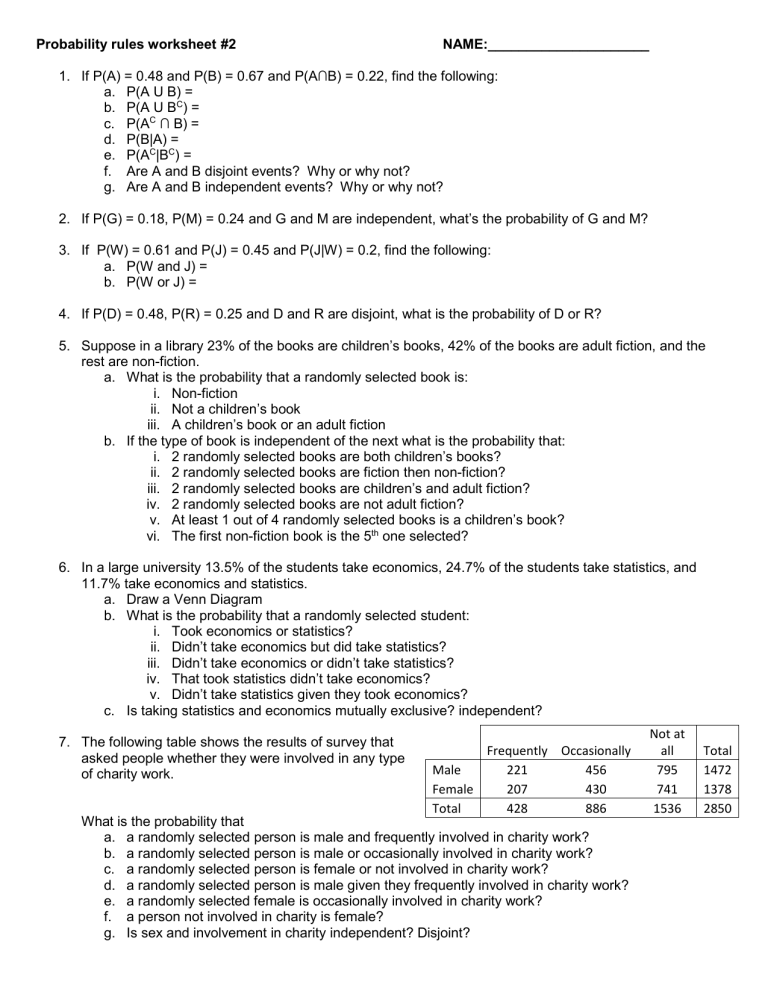
Probability rules worksheet #2 NAME:_____________________ 1. If P(A) = 0.48 and P(B) = 0.67 and P(A∩B) = 0.22, find the following: a. P(A U B) = b. P(A U BC) = c. P(AC ∩ B) = d. P(B|A) = e. P(AC|BC) = f. Are A and B disjoint events? Why or why not? g. Are A and B independent events? Why or why not? 2. If P(G) = 0.18, P(M) = 0.24 and G and M are independent, what’s the probability of G and M? 3. If P(W) = 0.61 and P(J) = 0.45 and P(J|W) = 0.2, find the following: a. P(W and J) = b. P(W or J) = 4. If P(D) = 0.48, P(R) = 0.25 and D and R are disjoint, what is the probability of D or R? 5. Suppose in a library 23% of the books are children’s books, 42% of the books are adult fiction, and the rest are non-fiction. a. What is the probability that a randomly selected book is: i. Non-fiction ii. Not a children’s book iii. A children’s book or an adult fiction b. If the type of book is independent of the next what is the probability that: i. 2 randomly selected books are both children’s books? ii. 2 randomly selected books are fiction then non-fiction? iii. 2 randomly selected books are children’s and adult fiction? iv. 2 randomly selected books are not adult fiction? v. At least 1 out of 4 randomly selected books is a children’s book? vi. The first non-fiction book is the 5th one selected? 6. In a large university 13.5% of the students take economics, 24.7% of the students take statistics, and 11.7% take economics and statistics. a. Draw a Venn Diagram b. What is the probability that a randomly selected student: i. Took economics or statistics? ii. Didn’t take economics but did take statistics? iii. Didn’t take economics or didn’t take statistics? iv. That took statistics didn’t take economics? v. Didn’t take statistics given they took economics? c. Is taking statistics and economics mutually exclusive? independent? 7. The following table shows the results of survey that asked people whether they were involved in any type of charity work. Frequently Occasionally Male 221 456 Female 207 430 Total 428 886 What is the probability that a. a randomly selected person is male and frequently involved in charity work? b. a randomly selected person is male or occasionally involved in charity work? c. a randomly selected person is female or not involved in charity work? d. a randomly selected person is male given they frequently involved in charity work? e. a randomly selected female is occasionally involved in charity work? f. a person not involved in charity is female? g. Is sex and involvement in charity independent? Disjoint? Not at all 795 741 1536 Total 1472 1378 2850 Probability rules worksheet #2 NAME:_____________________ 1. If P(A) = 0.48 and P(B) = 0.67 and P(A∩B) = 0.22, find the following: a. P(A U B) = 0.93 b. P(A U BC) = 0.55 c. P(AC ∩ B) = 0.45 0.22 0.4583 0.48 0.07 e. P(AC|BC) = 0.2121 0.33 B A .26 .22 d. P(B|A) = .45 .07 f. Are A and B disjoint events? Why or why not? Not disjoint. P(A∩B) = 0.22 0 g. Are A and B independent events? Why or why not? Not independent. P(B|A) = 0.4583 ≠ P(B) = 0.67 2. If P(G) = 0.18, P(M) = 0.24 and G and M are independent, what’s the probability of G and M? P(G∩M) = 0.18 * 0.24 = 0.0432 3. If P(W) = 0.61 and P(J) = 0.45 and P(J|W) = 0.2, find the following: a. P(W and J) = 0.61 * 0.2 = 0.122 b. P(W or J) = 0.61 + 0.45 – 0.122 = 0.938 4. If P(D) = 0.48, P(R) = 0.25 and D and R are disjoint, what is the probability of D or R? P(D U R) = 0.73 5. Suppose in a library 23% of the books are children’s books, 42% of the books are adult fiction, and the rest are non-fiction. a. What is the probability that a randomly selected book is: i. Non-fiction P(NF) = 0.35 ii. Not a children’s book P(CC) = 0.77 iii. A children’s book or an adult fiction P(C U AF) = 0.65 b. If the type of book is independent of the next what is the probability that: i. 2 randomly selected books are both children’s books? P(C ∩ C) = 0.23 * 0.23 = 0.0529 ii. 2 randomly selected books are fiction then non-fiction? P(AF ∩ NF) = 0.42 * 0.35 = 0.147 iii. 2 randomly selected books are children’s and adult fiction? P(C ∩ AF) = 2(0.23)(0.42) = 0.1932 iv. 2 randomly selected books are not adult fiction? P(AFC ∩ AFC) = (0.58)(0.58) = 0.3364 v. At least 1 out of 4 randomly selected books is a children’s book? P(at least 1 C) = 1 – P(CC ∩ CC ∩ CC ∩ CC) = 1 – (0.77)4 = 0.6485 vi. The first non-fiction book is the 5th one selected? P(NFC ∩ NFC ∩ NFC ∩ NFC ∩ NF) = (0.65)4(0.35) = 0.0625 6. In a large university 13.5% of the students take economics, 24.7% of the students take statistics, and 11.7% take economics and statistics. a. Draw a Venn Diagram b. What is the probability that a randomly selected student: i. Took economics or statistics? P(E U S) = 0.265 ii. Didn’t take economics but did take statistics? P(EC ∩ S) = 0.130 iii. Didn’t take economics or didn’t take statistics? P(EC U SC) = 0.883 iv. That took statistics didn’t take economics? P(EC|S) = S E .018 .117 .130 .735 0.130 0.5263 0.247 v. Didn’t take statistics given they took economics? P(SC|E) = 0.018 0.1333 0.135 c. Is taking statistics and economics mutually exclusive? independent? Not mutually e 7. The following table shows the results of survey that asked people whether they were involved in any type of charity work. Frequently Occasionally Male 221 456 Female 207 430 Total 428 886 What is the probability that a. a randomly selected person is male and frequently involved in charity work? P(M ∩ Fr) = 221 0.0775 2850 b. a randomly selected person is male or occasionally involved in charity work? P(M U O) = 1472 886 456 1902 0.6674 2850 2850 2850 2850 c. a randomly selected person is female or not involved in charity work? P(F U N) = 1378 1536 741 2173 0.7625 2850 2850 2850 2850 d. a randomly selected person is male given they frequently involved in charity work? P(M|Fr) = 221 0.5164 428 e. a randomly selected female is occasionally involved in charity work? P(O|F) = f. 430 0.3120 1378 a person not involved in charity is female? P(F|N) = 741 0.4824 1536 g. Is sex and involvement in charity independent? Disjoint? They are independent. P(F|N) = 0.4824 = P(F) = 0.4835 They are not disjoint. P(M ∩ Fr) = 0.0775 ≠ 0 Not at all 795 741 1536 Total 1472 1378 2850
